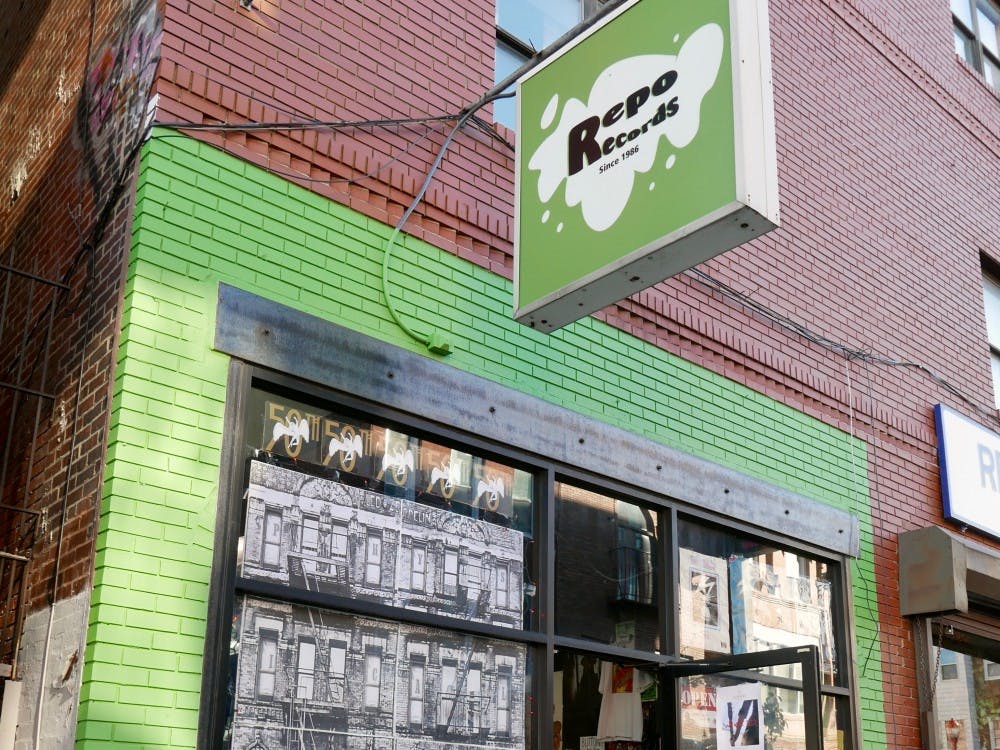The time has come: you’ve finally decided to get into collecting vinyl. Maybe you want to go off the beaten path and start collecting cassette tapes instead, or maybe now that your entire music collection is streaming online, you need to offload those hundreds of CDs that have been collecting dust for the past few years. A short trip on the Route 40 bus away from University City lies your destination: Repo Records.
Repo exists at the heart of the Philly underground music scene at 506 South St., only two blocks away from TLA, one of the best concert venues in America. Its distinguishing outside feature is the green brick surrounding the entrance, which leads you inside to new and used vinyl, cassettes, and CDs, as well as used clothing, posters, patches, and other musical paraphernalia for all the diehard and wannabe punks out there.
Besides the assortment of music and merch, there’s another big thing that gives Repo its signature charm: the people. South Street has long been known for its grit and its alternative crowd, and the Repo customers are no exception. Employee Jacki Weaver recounts a recent quirky occurrence: “One day I was putting out some new CDs on the floor and suddenly there’s a woman holding a little dog standing next to me, whispering in the dog’s ear, ‘Do you like this music, Michael?’” Owner Dan Matherson confirms: “It’s a regular routine of weirdness down here.”

Dan started Repo in 1986 in Wayne, Pennsylvania, at a time when record stores were in a state of decline: the few existing shops in the area catered to the popular music of the time, not the punk and new wave that he preferred. There was no place around Wayne to find the types of records Dan wanted, so he would take regular trips up to New York to discover new artists through buying music and attending shows. Inspired by the energy of the New York punk scene, Dan decided to start Repo as “a way of turning people onto this whole music scene” in a pre–Internet era. A second shop would open in Bryn Mawr in 1989 before the store moved to South Street in 1997.
Dan wasn’t bothered by the move. “Being associated with [South Street] has definitely helped,” he says, although he voiced some concern about the direction the eccentric neighborhood is going. “It’s trying to redefine its identity … when I moved down here, there were eight record stores in a four–block area, and now there’s two.” Outside of the street, Dan does have faith in the state of Philadelphia music as a whole. “There’s big up times and down times, and this is a big up time. There’s a lot of great local artists.”

One of the contributors to the downturn of physical record stores has been the growing presence of online retailers. Spotify and iTunes allow customers to download and listen to all their favorite songs much faster and for much lower prices than buying a vinyl record, and even buying records has become automated with the rise of Amazon. Dan, however, still believes in the merit of going to a physical record store. “People want to come in here, hold the record, look at it,” he explains, “Not everyone wants to buy stuff online.” While he acknowledges that tools like Spotify help us to discover new music, he isn’t convinced that streaming and downloading are how music was meant to be enjoyed. “When bands put out records, the creativity’s in the artwork too. That’s part of what the album means to them. [People] don’t get what the record’s all about if they don’t see the art, the cover, the stuff in the liner notes.”
Many Penn students struggle to leave the campus bubble, and they may be tempted to shop online for the vinyl they desire. To those people, embrace the weirdness and take a trip down to Queen Village to experience record hunting as it was meant to be.







